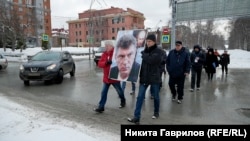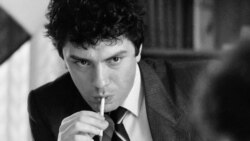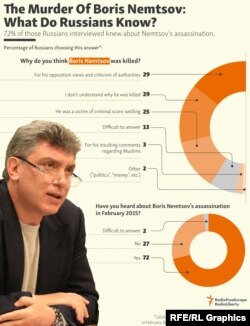MOSCOW -- Thousands of people have gathered in Moscow and other Russian cities to mark the anniversary of the killing of Boris Nemtsov, a vocal Kremlin critic and former deputy prime minister who was gunned down five years ago near the Kremlin.
The February 29 demonstrations appeared to be some of the biggest political protests in Russia since last summer, when several weeks of anti-government meetings challenged the authorities in Moscow over local city council elections.
Watch Current Time's live broadcast of Russia's February 29, 2020 memorial marches for Boris Nemtsov:
They also come as lawmakers and Kremlin officials prepare for a national vote on major constitutional change unveiled last month by President Vladimir Putin.
Chants of "Putin is a thief" and "Russia without Putin" echoed among the crowd in the Russian capital, with many demonstrators carrying Russian flags and flags of the political party Nemtsov was affiliated with. Others held signs reading "Propaganda kills" and "Boris" and photographs of Nemtsov.
One group held a banner that read "Ukraine, we are with you" -- a reference to the six-year war in eastern Ukraine, pitting Ukrainian government forces against Russia-backed militias.
"We don't need a cult, we need a leader," one participant told Current Time at the Moscow rally. "We need a normal economy that's right for a giant country like ours.... Education, science, social welfare, we're in last place in so many rankings. It's a disgrace."
The protest was authorized by Moscow city officials.
Other, smaller events took place in Russia's second-largest city, St. Petersburg, Novosibirsk, and many other cities across the country. In the Pacific port of Vladivostok, several people were detained by the police as they held placards commemorating Nemtsov.
Some opposition supporters have said they plan to use the event to protest proposed amendments to the country's constitution. Critics say the planned changes are aimed at extending Putin's grip on power after his current presidential term ends in 2024.
The amendments unveiled by Putin last month are the most substantive changes to the constitution since its adoption in 1992.
Protest organizers, including anti-corruption crusader Aleksei Navalny, called for a mass turnout, calling it a test of Russians' willingness to push back against Putin's proposals.
"The Kremlin is going to look at how many people attend the Nemtsov march," Navalny said on February 28.
White Counter, a nongovernmental organization that estimates attendance at political protests, said more than 8,000 people had joined the Moscow protest by the official beginning of the march.
A deputy prime minister under Putin's predecessor, Boris Yeltsin, Nemtsov was a charismatic and vocal critic of Putin. He was shot at close range on the Bolshoi Moskvoretsky Bridge, a stone’s throw away from the Kremlin in central Moscow, on February 27, 2015, as he walked with a female companion.
In June 2017, a Russian court sentenced a former Chechen military officer, Zaur Dadayev, to 20 years in prison for killing Nemtsov.
Four other Chechens were found guilty of involvement in the killing and sentenced to prison terms ranging from 11 to 19 years.
But critics, including relatives and colleagues of Nemtsov, say the Russian authorities failed to determine who ordered the killing.
Some have expressed suspicions that the killing was ordered by someone within the inner circles of Putin or Chechen leader Ramzan Kadyrov.
A report from the Organization for Security and Cooperation in Europe (OSCE) on February 20 called for "a new and full investigation" into Nemtsov's slaying.
The report, by the OSCE Parliamentary Assembly's special rapporteur, Margareta Cederfelt, said shortcomings in Russia's original investigation left many questions unanswered.
"His death was a tragedy for Russia and had a strong impact on the political climate, spreading fear and possibly opening up for further attacks and repression," the report said.








Facebook Forum